'The Iron Claw' - The SHOCKING True Story Of The Von Erich Family
Rise and Fall of the Von Erichs
Pro wrestling is a comic book come to life - a wild mixture of brawny superheroes, unrepentant villains, and enough bombast and pathos to fit tightly within the framework of the story panels. In this larger-than-life masquerade of uber-humanity, the greatest superheroes develop immense fan followings. And for a time, professional wrestling had a veritable Justice League in the ever-popular Von Erich family of Dallas.
Though the patriarch had once ruled the rings as a detestable heel, Fritz Von Erich's offspring were programmed to play the opposite role: virtuous, salt-of-the-earth athletes with rock star good looks, and a likeable modesty. Women and men of all ages found something to like about the Von Erich children, be it their boyish appearances, their superb in-ring acumen, their grit in heated conflicts, or perhaps just the fact that they appeared to be the idealised American family, so clean-cut, upstanding, and spiritually devout.
While the Von Erich name was once arguably that of the first family of wrestling, their Iron Claw-like grip on the ringside pulse started loosening with the passage of time. Regrettable incidents, an increasingly threadbare mythology, and a series of deaths cast a sobering glance on the mortals behind the mythos. What was once a sure-thing dynasty within the confines of the squared circle became a cautionary tale, compounded by the gradual destruction of once-unwavering faith.
Jack Barton Adkisson was born August 16, 1929 in Jewett, TX, more than an hour and a half south of Dallas. Before his twenty-first birthday, Adkisson (an athletic hopeful at Southern Methodist University) had gotten married to Doris, his wife of the next 40-plus years. Fritz and Doris brought six sons into the world, beginning in 1952 with the birth of Jack Jr. Unfortunately, Jack passed away at just six years of age, drowning in a puddle after touching a live wire.
When Jack Jr was still young, Sr ventured to Canada to try out for the Canadian Football League. While it didn't work out, Adkisson did make the acquaintance of one Stu Hart, pro wrestler extraordinaire, and the promoter of what is best known as Stampede Wrestling.
Adkisson certainly wasn't the first, nor the last gridiron football player to transition into professional wrestling, but few other footballers had ever taken on the gimmick Adkisson had upon entering the biz.
Around 1953, Adkisson was redubbed Fritz Von Erich, an "evil German" meant to conjure up thoughts of the since-overthrown Third Reich. In a post-war North America, it wasn't uncommon for wrestlers of any ethnicity to trade on the nationalities of countries still considered "the enemy”.
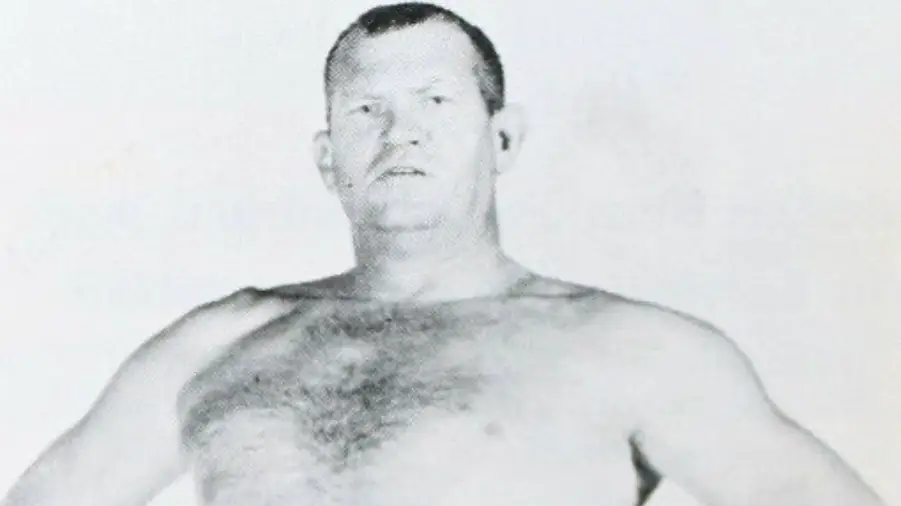
As Fritz, Adkisson teamed with Walter Sieber, the Canadian-born son of a German immigrant, who was playing a similar character. Sieber amended his handle to become Waldo Von Erich, the kayfabe brother to Fritz, and the two rode the inevitable wave of audience resentment to great success as top barnstorming villains.
Following Jack Jr's death, Fritz and Waldo slowly began to go their separate ways, in part due to Fritz's reluctance to travel to the East Coast. As a solo star, Fritz remained a headlining heel, winning the AWA World Title from Verne Gagne in 1963. He also challenged for the NWA Worlds Heavyweight Championship, but was unsuccessful, even bowing out of the St Louis territory in 1967 after failing to capture the gold from champion Gene Kiniski.
In 1966, after falling out with Dallas-area promoter Ed McLemore, Fritz functionally took over the territory by banding together all the top wrestlers to come work with him instead. McLemore continued to work with Fritz in a rather focal position (at the insistence of St. Louis promoter Sam Muchnick), but passed away in 1969, leaving Fritz as the sole owner of the Dallas group.
Like many local promoters that wrestle high on their own cards, the once-villainous Fritz was behoved to turn babyface. He kept the Von Erich name, but Fritz did indeed "go good", rendering the earlier character pretence as but a footnote. For the decade or so that followed, Fritz lorded over the Dallas rings as NWA American Heavyweight champion, battling every nefarious foe that dared try him in North Texas.
By the time Fritz was assuming full control of the Dallas territory, four of his other five children had been born. Each of those five would follow him into the ring, with varying levels of success.
There was Kevin, born in 1957. David followed a little over one year later. Kerry was born in 1960, while Mike followed in 1964. The last of the sons, Chris, was born in the autumn of 1969.
Like their father, the Von Erich boys got into athletics. Kevin briefly played football at the collegiate level, while Kerry was a track star, earning a scholarship to the University of Houston on the merits of his championship-calibre discus throw.
In the latter half of the 1970s, Kevin, David, and Kerry all began their wrestling careers, under the tutelage and watchful eye of Fritz. Each of the sons brought unique traits to the table that distinguished themselves from even each other. The lanky but aerodynamic Kevin often wrestled barefoot, and was identifiable by his quiet, free-spirited confidence. Kevin also possessed a well-defined frame, it paled to that of Kerry's granite-sculpted body, resembling that of the protagonist of some sword-and-sorcery epic. Add on a flowing mane of golden-brown locks, and an affable physical charisma, and it's no surprise that female fans adored the adonis-like Kerry.
While Kerry had the bulk, David had the height. Kevin and Kerry each topped out around 6’ 2”, but David stood tallest, billed at a towering six feet seven inches tall. Nicknamed "The Yellow Rose of Texas", David was the most overarching flower in the Von Erich garden. He may not have had the carved physiques of his brothers, but David surpassed them in other important aspects. For one thing, David was a strong promo, with a broader emotional range than his more understated siblings. He was also the best in-ring wrestler of the Von Erich brood, having honed his craft throughout the territories by playing the heel in places like Florida.
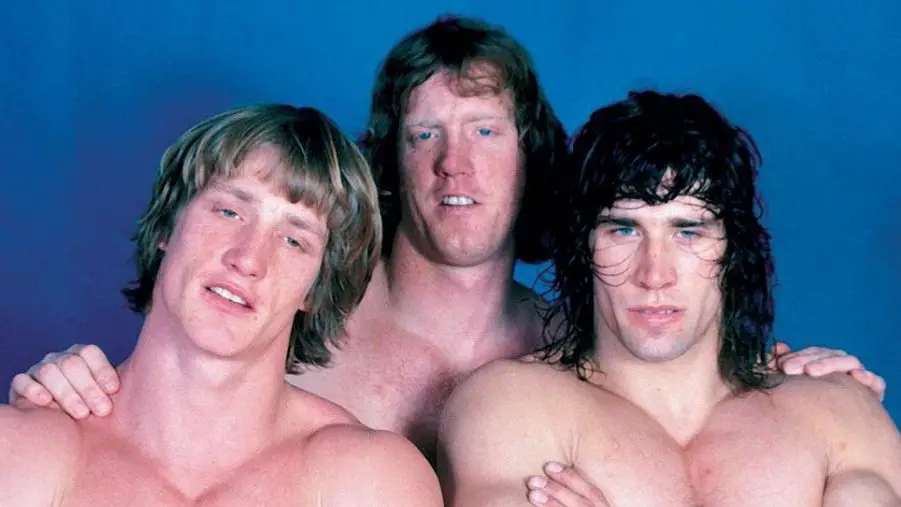
David's growth as a wrestler came away from his Dallas home, which is important to note. Critics of Fritz Von Erich maintain that he held a tight grip on his children, controlling them even after they'd reached maturity. Renowned manager and booker Gary Hart claimed in his memoirs that Fritz intentionally underpaid his sons, so as to keep them tethered and dependent to his ruling hand. Hart (who helped handle World Class' finances and payoffs for a time) revealed that when the boys worked in Japan, if they got $2500, Fritz would take $1000 from them as his "booking fee".
Hart said: “(Fritz) wanted to ensure that they would always be dependent on him financially, and he never wanted to lose that control - even when they were grown and out of the house."
An article penned by journalist Irv Muchnick in the late 1980s, meanwhile, claimed that after the older crop of Von Erich boys grew up and got married, none of them lived much more than a mile from their childhood home. An individual close to the family noted how strict Fritz was with his sons, that he, "...ruled the roost with an iron hand."
In 1981, David briefly fell out with Fritz, and set out on the road, where he continued his wrestling education away from home. By the time David returned many months later, he was the most astute and prodigious of the Von Erich kids, having picked up seasoning he'd have never gotten had he remained sequestered in his home region.
The timing was perfect, because by the time the well-rounded David returned home in mid-1982, his aging father was hanging up the boots.
Fritz Von Erich staged his own retirement show that June at Texas Stadium, defeating young King Kong Bundy in what was meant to be his final match. David, Kevin, and Kerry worked in the two bouts prior to the main event.
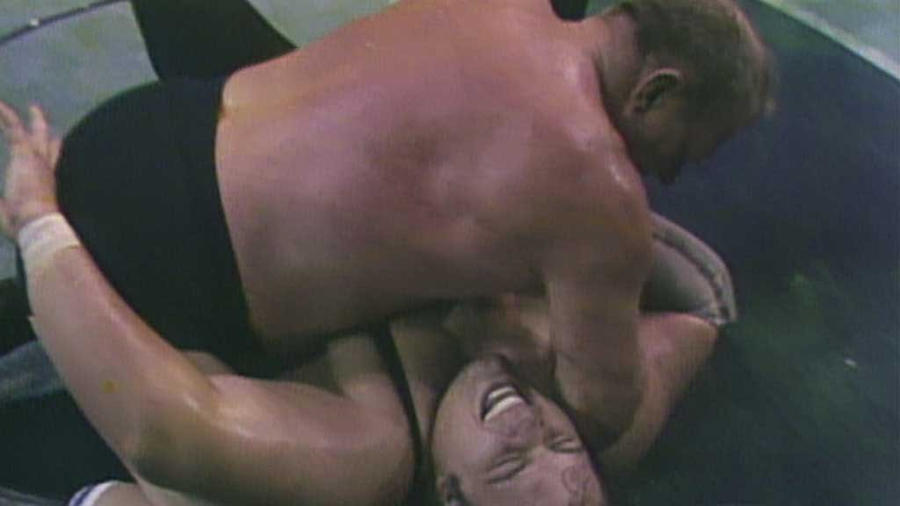
Months earlier, the Dallas territory that had gone through a handful of name changes settled upon the one that most often defines it today: World Class Championship Wrestling.
World Class was more than just a wrestling territory - it was a revelation for wrestling fans, and an evolution of how the product could look on television. After World Class began a relationship with KXTX, the Christian Broadcasting Network's Dallas affiliate, Fritz's programs became state-of-the-art. Slick production values, the incorporation of contemporary music and video packages, you name it: World Class predated the WWF's Rock 'n Wrestling Connection by more than two years, and elevated the standard for all televised wrestling. Kerry himself became notable for his entrance theme, Rush's "Tom Sawyer", from which he derived his nickname, "The Modern Day Warrior".
While Vince McMahon forged his national expansion, World Class was syndicated to dozens of US TV markets, and even received clearance on the nationally broadcast ESPN in 1986. Due to his retirement, though, Fritz wouldn’t be the star of this revolutionary, cutting-edge TV product. His sons would be.
This was just fine with the fans in Dallas - perhaps no other territory loved their local heroes the way Dallas revered the Von Erich boys. Bruno was a mythic figure in New York, sure, but he didn't inspire the sort of rock star idolatry that was afforded to David, Kevin, and Kerry.
Whenever any or all of the brothers stormed the ring at Dallas' Sportatorium, or Reunion Arena, or cavernous Texas Stadium, they were routinely rushed by throngs of screaming supporters, all seeking a brush with their heroes. These Von Erichs were The Beatles in tights.
A crucial part of the Von Erich allure was their perceived innocence. Outside of David's prideful exuberance, the boys all came off as clean-cut and mostly wholesome, only resorting to aggressive behaviour whenever they had to fend off some evildoer between the ropes.
There was also a religious component to the Von Erichs and World Class. Fritz became a born-again Christian in the mid-seventies, a combination of being moved by a particular sermon he'd heard, followed by a "divine voice" guiding him to Psalms 23. After pulling his car off the interstate one day to consider his sins, Fritz continued his religious awakening.
Over the years that followed, Fritz appeared on local TV programs, as well as Pat Robertson's The 700 Club, to share his experiences and faith. World Class programs would even feature an official "chaplain" in the form of Reverend Gary Holder. Fritz's local celebrity and his television connections are what got World Class linked up to the Christian Broadcasting Network, and allowed for his wrestling show to gain deeper syndication reach across the United States. The glossy-looking programs and colourful cast of characters turned World Class into one of the hottest territories in the country in the early 1980s.
At the epicentre of all the hoopla were Fritz's sons, positioned as the stars of the show. None of the boys needed a gimmick outside of their basic humanity - these were good ol' Texas boys fighting for God and country, with legions of adoring fans eating out of the palms of their hands. To fight the Von Erichs was to fight all of Dallas - and the odds weren't in the bad guys' favour.
Among the impressive cadre of imported evils that warred with The Von Erichs, their most famed rivals were The Freebirds: Michael "PS" Hayes, Terry Gordy, and Buddy Roberts. Kerry had originally befriended the eccentric trio from Atlanta, and that union looked like it was going to benefit Kerry on Christmas night 1982.
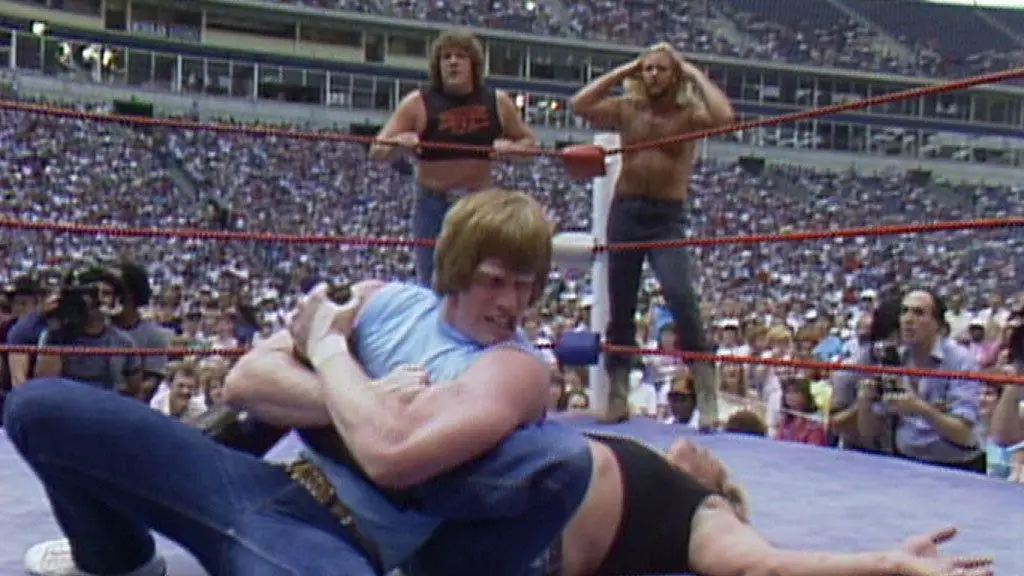
It was in front of 12,000 fans at Dallas' Reunion Arena that Kerry was to challenge Ric Flair for the NWA Worlds Heavyweight title, inside of a steel cage (which accounted for the first-ever $100,000 pro wrestling gate in the state of Texas). After a series of contested finishes between the two over prior months, the cage was brought in to definitively settle the score.
A fan vote was conducted to determine the guest referee for the bout, and it so happened that Hayes got the nod, seemingly giving hometown Kerry an advantage. To the Dallas faithful, it appeared the greatest gift of all would be unwrapped at the end of Christmas Day: Kerry Von Erich winning the NWA Worlds Title in front of 12,000 of his friends and neighbours.
What they actually got was the impetus for the territory's all-time greatest feud. Late in the heated match, Kerry sufficiently wore down Flair with the Iron Claw he'd inherited from his old man. A rope break saved Flair temporarily, but not for long. Soon after, a giddy Hayes knocked the wounded Flair out and implored Kerry to take the win. Righteous Kerry, however, refused to win the world title in such a manner.
An irate Hayes went to leave the cage, and when Kerry tried to stop him, Gordy (who had been present at ringside) slammed the door on Kerry's head, knocking him out and costing him the match.
Years of lucrative animosity between the Von Erichs and the Freebirds followed, in front of sold-out houses filled to capacity with Von Erich backers.
Regional battle lines were drawn between the Texas-bred good guys and the devilish gang from Georgia. The trios exchanged the Texas version of the NWA World Six Man Tag Team Titles throughout the first half of the eighties, while the boiling-hot feud also grew to include members of Skandor Akbar’s Devastation Inc.
So many antagonists occupied the World Class scene, while Fritz's boys withstood the many blitzes. Business boomed, crowds filled large venues, and the humble sons of Dallas continued to be the undisputed stars.
The star turns were due to continue. While Kerry fell short in his bid to win the NWA Worlds Title, one of his brothers was all but being fitted to wear the belt in the not-too-distant future.
And then, tragedy struck.
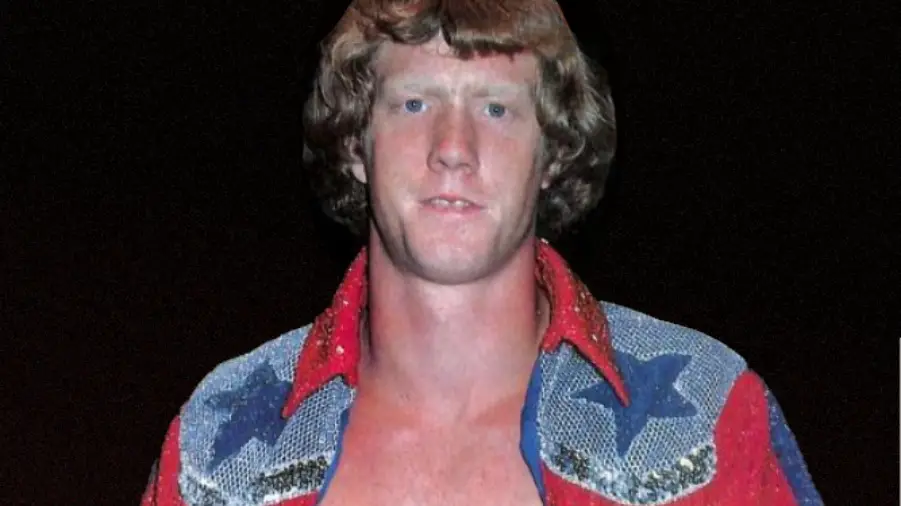
Fritz Von Erich was still a big part of the NWA machine, and his voice carried a lot of weight. He pushed for David to win the NWA Title, a belt he reportedly regretted never having won himself. Fritz wasn't the only bigwig with interest in seeing David tote the "ten pounds of gold", as the committee seemed to have plans to crown David sometime in the near future.
In February 1984, to continue his improvement inside the ring while also building his name outside the US, David embarked on a tour with All Japan Pro-Wrestling.
On February 10, David wasn't present in the hotel lobby in Tokyo as the troupe was heading out to the first booking. Several individuals then went to David's hotel room and found him dead on the floor. "The Yellow Rose of Texas" was only 25.
The circumstances of David's death remain disputed, even to this day. "Officially", David died of enteritis, an inflammation of the small intestines. Rumours and gospel through the years have it as a drug-related death, as stories claim that some quantity of drugs found in David's room was quickly disposed of before the authorities arrived. In Dave Meltzer's 1997 obituary of Fritz, he states one commonly-held theory, that a night of drinking combined with David taking sedatives caused a fatal toxicity.
Wherever exactly the truth lies, it wouldn't be found in the Von Erich family's version of events. Fritz and company wove a fantastical death for David to their fans, claiming that he died after sustaining "a hard lick" during a rough-and-tumble battle in Japan, when in fact he hadn't even wrestled his first match of the tour yet. After all, dying in battle is more honourable than meeting your end in some quiet hotel room.
Journalist Irv Muchnick claimed in his essay on the family that the Von Erichs (in order to dispel any suspicions and questions) offered to show him David's death certificiate and autopsy report, but later reneged on that offer. Pro wrestling has always been about mythmaking and storytelling, but through this public spinning of David's demise, Fritz was playing a dangerous game with the trust of his audience. And it wouldn't be the last time he did so.
For now, businessman Fritz had the unenviable task of filling the void left by David. A world champion-level star with talent beyond his years doesn't replace easy. In the short term, a feel-good moment was conscripted.
In the name of his fallen brother, Kerry would step up to the plate and challenge Flair for the NWA Worlds Heavyweight Title on May 6, 1984 at Texas Stadium. The supercard was dubbed the Von Erich Memorial Parade of Champions. Kerry's date with destiny drew over 32,000 spectators, and a box office slightly north of $400,000.
For the occasion, Fritz broke his retirement to team with sons Kevin and Mike (who had turned pro in 1983) against The Freebirds in the semi-main. While Fritz was local royalty, all eyes were on Kerry making good on his golden opportunity, while David watched from above.
Flair may have been the "60-minute man", but he needed little more than 11 minutes to cede the championship to Kerry, dropping the title to a garden-variety backslide. No matter the method, Kerry Von Erich was now heavyweight champion of the world, fulfilling his dedication to David, and sparking tearful jubilance among the large stadium crowd.
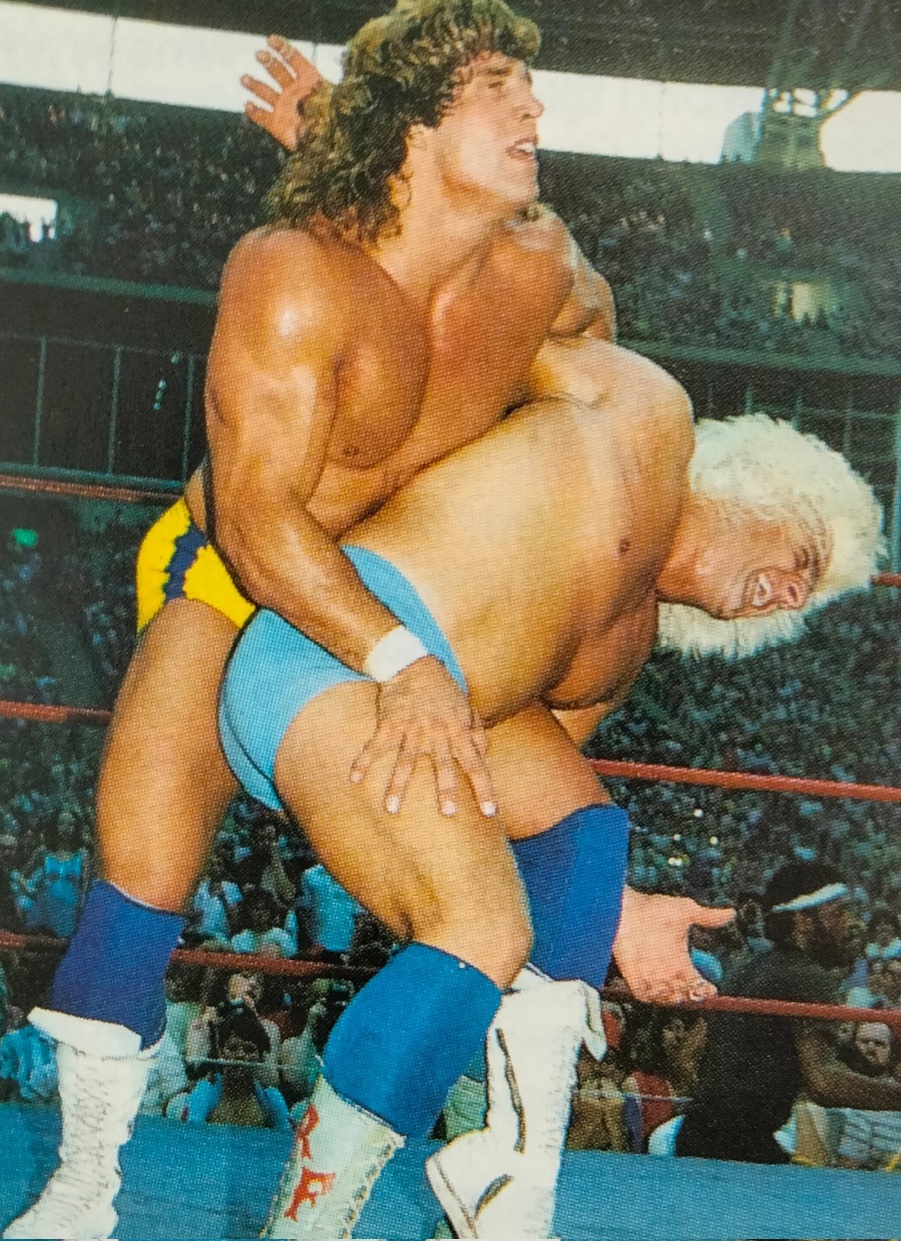
With the win, Fritz and Kerry became the only father-son duo to each hold recognised singles world titles until Cody Rhodes equalled Dusty by winning the ROH World title in 2017. Eighteen days later, Kerry lost the belt back to Flair in Yokosuka, Japan.
The reign was never going to be a long one. Kerry, for all of his positive attributes, had garnered a reputation as being "flaky", and the NWA board didn't trust him as a long-term titleholder. Flair himself, while noting he liked Kerry as a person, confirmed that "The Modern Day Warrior" was difficult to work with, due to his forgetful and distracted nature.
More plainly put, Kerry had major issues with drugs. As one example, in June of 1983, Kerry was returning from his honeymoon in Mexico when customs agents at the DFW Airport found 18 unmarked pills in his front pocket. They also discovered a plastic bag with over 300 pills inside his pants, the majority of which were painkillers like percodan and codeine.
To preserve the family name and image, Kerry went on World Class television to implore fans not to believe the stories they hear. There was also a vague storyline implication that the Freebirds had tried to frame Kerry, their on-screen rival.
Many months of wrangling outside the public eye resulted in all charges against Kerry being dropped. Kerry's issues and reputation may have made him a liability as a long-term champion, but for all his foibles, he was at least widely accepted in the role of star wrestler.
One of his younger brothers didn't fit that bill so easily.
Mike Von Erich had been wrestling for just shy of one year at the time of David's death, the fourth of the Von Erich boys to lace up the boots. But while Kevin, David, and Kerry each possessed qualities that justified their standings as main event players, all Mike had was a famous surname.
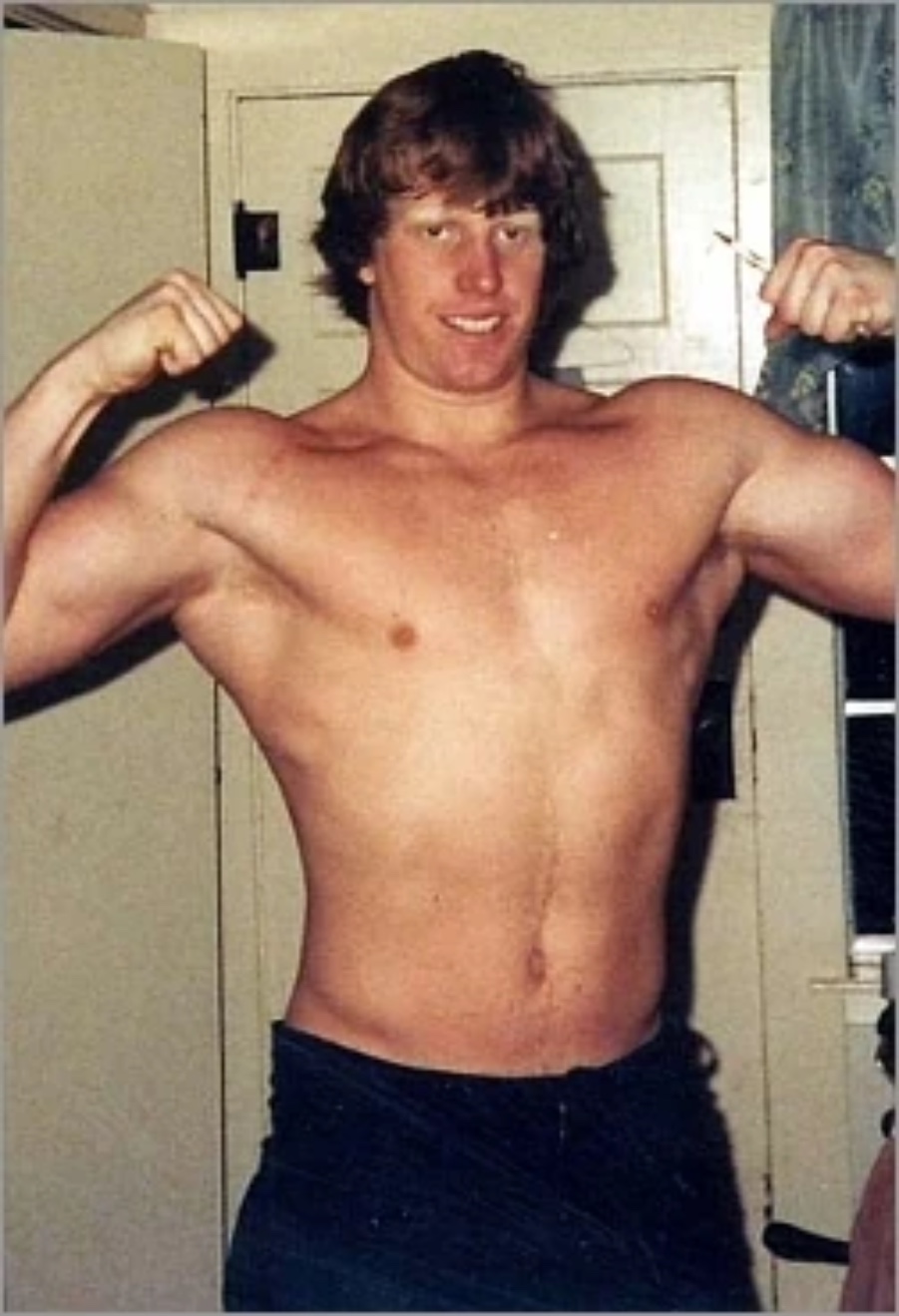
The shy and earnest Mike lacked any semblance of next-level wrestling skill. It also didn't help that he lacked a "star look", more resembling a bandier, undersized version of David. Compared to musclebound Kerry and suitably-fit Kevin, Mike looked like exactly what he was: their little brother.
Supposedly, Mike never wanted to be anything more than a cameraman, but was pressured by Fritz into carrying his share of the Von Erich name inside the ropes (specifically, the share David left behind). And so Mike tried his best to fill David's void in trios bouts alongside his brothers, while Fritz pushed him hard as the latest in a long line of his genetic prodigies fans weren't buying it.
Plagued by his own drug use as well as a chronic shoulder injury, Mike's young wrestling career took a turn for the worse in the summer of 1985, when he badly injured that shoulder while wrestling a match in Israel. After undergoing surgery back home, Mike was soon rushed back to the hospital after developing a dangerously high fever, as well as a case of toxic shock syndrome.
Despite those horrible afflictions, as well as reported kidney dysfunction, Mike managed to survive. However, the extreme toll was made obvious at a questionable press conference held shortly thereafter. Appearing alongside his brothers and his doctor, Mike was gaunt and glassy-eyed. Some sources have it that Mike lost over 30 pounds due to the ordeal, strip-mining his already rail-thin frame well below a passable standard for a wrestler. More alarming was the fact that Mike noticeably slurred his words during the presser, while his eyes remained unfocused. Some speculated that Mike may have suffered brain damage.
While it was abundantly clear that Mike's days as a wrestler were probably over, Fritz was quick to dub his son "The Living Miracle", and vowed that Mike would soon return to the ring, as "good" as ever.
Mike wouldn't actually wrestle again until the summer of the following year, so to fill *his* role, the Von Erichs reached out to another ‘relative.’ Inbound was Lance Von Erich, the purported son of Fritz's "brother" Waldo. This Von Erich cousin joined the family cause, teaming with Kevin and Kerry against those pesky Freebirds.
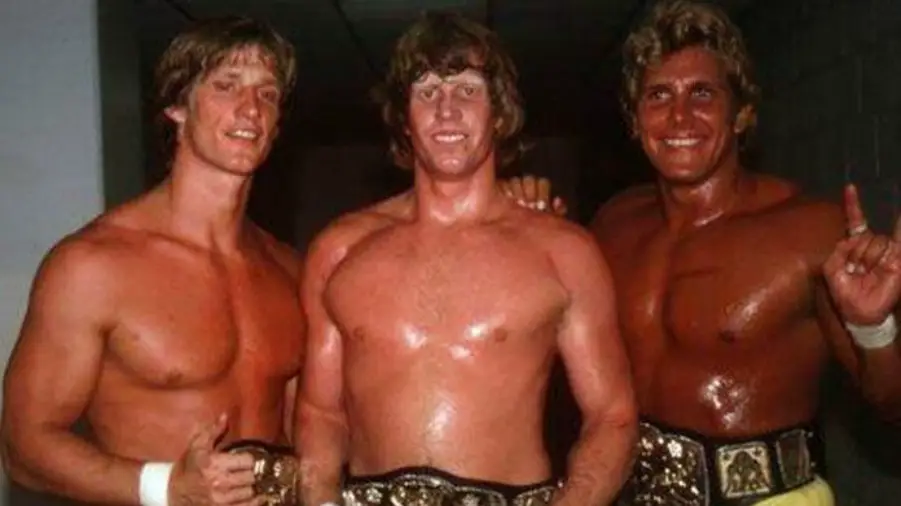
Lance was a local athlete named Kevin Vaughn, hand-selected for his chiselled build and telegenic good looks. But while Fritz was apt to continue dispensing manufactured Von Erichs off of some conveyor belt, son Kevin was vehemently against the idea.
He wasn't the only Texan that took exception. Fans saw through the ruse, as many recognised Lance as Vaughn, and knew full well that he wasn't a real relative. Nonetheless, Vaughn persisted as the mysterious cousin until leaving the territory in 1987 following a dispute. In a rare breach of kayfabe, Fritz, miffed at Lance for quitting, went on TV and exposed him as an impostor, adding that Lance would never return to World Class. For a lot of fans, that wasn't good enough.
When Von Erich-mania first swept up Dallas like a funnel cloud, the family could do no wrong in the eyes of the ticket-buying faithful. The injustices started piling up, though: David's "stated" cause of death, Mike's dire condition, the introduction of Lance.
The symbiotic relationship with the audience was straining. Dishonesty oozed through the Sportatorium woodwork. What was once a hot territory with a diehard fanbase was cooling rapidly, some of that chill self-induced.
Even away from Fritz's administrating, the bad news continued pouring in. In June of 1986, Kerry was involved in a serious motorcycle accident, causing severe damage to his right hip and leg. Eventually, doctors had to amputate Kerry's right foot, which resulted in him wrestling with a prosthetic for the remainder of his career (a fact that was somehow kept secret from most in the business).
Aside from a pair of matches in early 1987, Kerry was sidelined for the next 16 months, during which his reliance on painkillers grew heavier. While Kerry ailed, Mike completely fell apart. After his 1985 surgery, troubling incidents piled up, including a car accident and a pair of arrests for minor infractions.
Come April of 1987, nine months on from Mike's regrettable return to the ring, he was arrested for driving while impaired, and possession of controlled substances. After his bond was posted, Mike was freed from Denton County jail. He was never seen alive again.
In the days ahead, his family discovered several notes written by a despondent Mike, including at his apartment, and later his car, which was found at a park entrance. The notes indicated that Mike had chosen to take drastic measures, and indeed, his body was found in the wooded area of the park, enveloped in a sleeping bag. He had intentionally overdosed on Placidyl. Mike Von Erich was only 23.
The Von Erich Memorial Parade of Champions had continued after the 1984 tribute to David, albeit to slightly diminishing returns with each ensuing event. Whereas the inaugural card drew 32,000 for Kerry's ultimate triumph, the 1985 rendition lured a little over 26,000 to Texas Stadium. In 1986, the crowd fell to 24,000.
It was a whole other story come 1987, when the fourth Parade of Champions was held three weeks after Mike's suicide. The event was held once more at Texas Stadium, this time in honour of both David and Mike.
Demonstrating just how fast things can go south, only 5900 fans were in attendance for this Parade, to the tune of a relatively-paltry $71,000 at the box office. In another sign of the times, a special $100 ticket was offered that provided for a luxury box seat to the event, as well as dinner in the presence of the Von Erich family. Reportedly, that promotion was dropped after a mere 14 fans bought in.
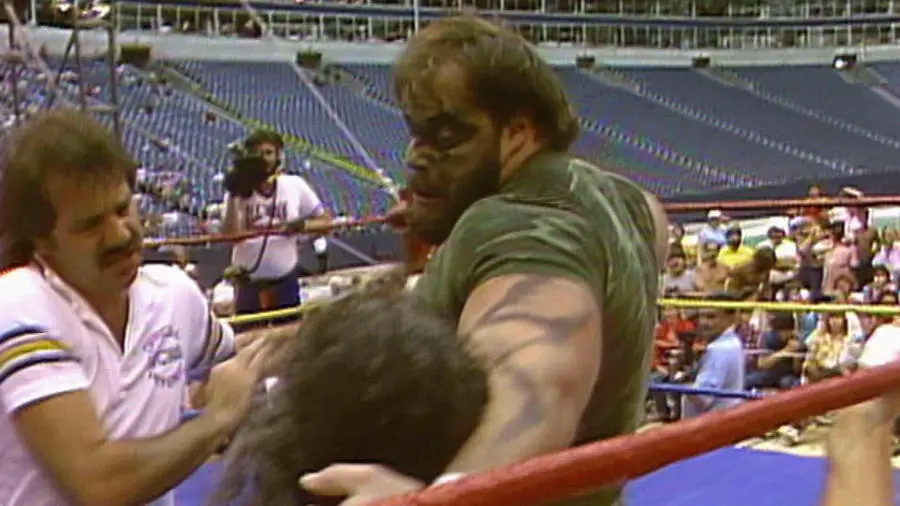
For the fans in Dallas, death as a recurring trope was becoming too much to bear. Between the Von Erich kids, as well as the sudden 1986 death of top heel Gino Hernandez, the ghoulishness was beginning to outweigh the mindless fun.
Another grim occurrence followed the week after the latest Parade of Champions. During an eight-man tag in Fort Worth, Kevin Von Erich suddenly collapsed while innocuously running the ropes, and began convulsing on the canvas. Fans watched in horror and bewilderment as tag partner Tommy Rogers hit the ring to administer CPR on the fallen Kevin.
While the real cause of Kevin's in-match crisis is disputed, the Von Erichs quickly turned it into a storyline. Turns out that rival wrestler Brian Adias had struck Kevin in the neck with a dastardly new move called the "Oriental Tool Punch", in an attempt to derail Kevin's career and life. This in spite of the fact that, per eyewitness accounts, no wrestler was in the vicinity of Kevin when he crumpled to the mat.
When World Class wasn't forced to deal with real-life tragedies, they would just invent their own. On Christmas night 1987, five years after the birth of the Von Erichs vs. Freebirds feud that juiced the territory to an unreal degree, Fritz took part in one last angle.
Before a dismal 2600 fans at Reunion Arena, Fritz intervened in a skirmish involving his kids and a group of heels. As he left the ring, Fritz suddenly collapsed at ringside from an apparent heart attack.
Though World Class stopped mentioning the words "heart attack" on their television after the first week or so, they still ran with the idea that Fritz was left in bad shape, and could really use everyone's support. According to Dave Meltzer, the idea was that if attendance was up, those giving updates on Fritz on TV would say that he was doing well. But if crowds declined, they would say that Fritz's condition had worsened - so, you know, come on out to the matches, because it would really lift Fritz's spirits if you brought the wife and kids.
While World Class had been in steep decline for some time, this was really the last straw for many. A man who let the public in to grieve with him and his family after the losses of his sons, how could he fake a life-threatening medical event before their eyes, in such a desperate appeal for sympathy and revenue?
As David Shoemaker of The Ringer went on to write, "...the Von Erichs had turned their backs on the unspoken agreement between the actors and the audience. They treated the fans as dupes instead of co-conspiritors."
World Class had gone from a movement centred on the lionisation of the pristine Christian athlete sons of the grizzled old wrestler in charge, to total disarray, fuelled by increasing mistrust, disconnect, and a disquieting death toll. Audiences will believe "The Big Lie" if everybody's having a good time. But few were having fun any more.
In the years that followed, World Class underwent several permutations, and formed strategic alliances with other territories trying to survive the rising tides. Memphis promoter Jerry Jarrett took over as majority owner in late 1988, buying out a financially-ailing Fritz.
Events continued to be promoted under the World Class banner until August 1989, when Dallas was fully absorbed into Memphis' United States Wrestling Association. Kevin attempted to bring World Class back in the autumn of 1990, but the revival was short-lived.
Over its final years, World Class had the dubious distinction of "winning" The Wrestling Observer's annual award for Most Disgusting Promotional Tactic four years in a row. 1985 went to the exploitation of a clearly-unwell Mike Von Erich, while 1986's award went to an actual on-screen comparison between the real-life death of Gino Hernandez and the storyline blinding of his nemesis, Chris Adams. Exploiting Mike's death took the 1987 dishonours, while Fritz's fake heart attack carried over enough into 1988 to win for that year.
World Class may have been gone, but things would continue to get worse for The Von Erichs.
To this point, the youngest Von Erich son, Chris, has been seldom mentioned. After occasionally getting involved in the odd angle as a teenager, Chris turned pro in 1990. Though he reportedly had the most love for wrestling out of all of his brothers, he was unfortunately the least physically-equipped to handle the sport.
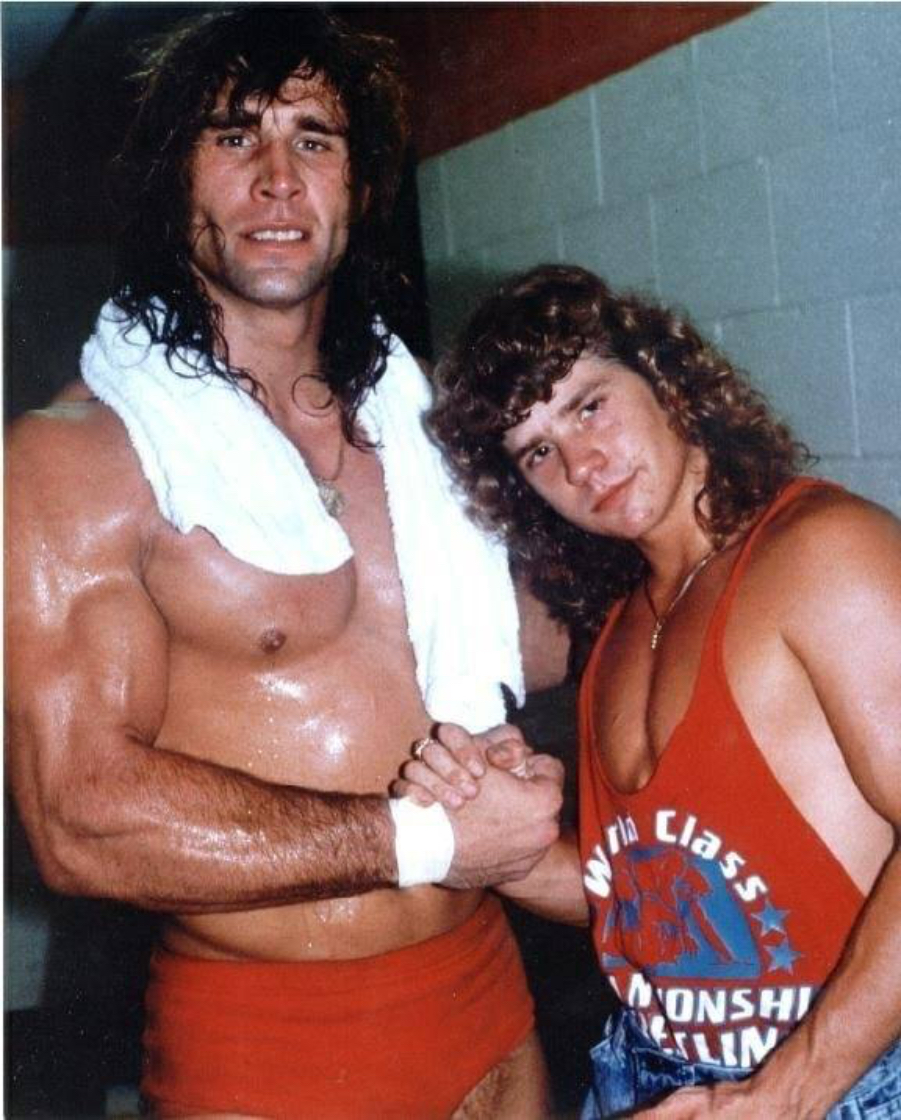
Undersized at five feet five inches tall, and compromised by several medical ailments (including asthma, as well as brittle bones caused by taking prednisone), Chris wasn't going to make it long-term inside the ring. Though fans cheered on the underdog kid brother in tag team outings, he sometimes broke bones doing routine moves.
An inability to follow in his brothers' footsteps left Chris distraught. In September of 1991, Chris Von Erich took his own life, shooting himself in the head on the family farm, weeks before his 22nd birthday.
At the time of Chris' death, Kerry was more than halfway into his run with WWE, where he was redubbed "The Texas Tornado". Though Kerry briefly held the Intercontinental title in 1990, he went adrift after losing it, existing as little more than a recognisable face in the star-studded midcard of the early 1990s.
Kerry's problems persisted. In February of 1992, he was arrested for trying to forge painkiller prescriptions, for which he eventually received 10 years of probation. That Spring, Kerry and his wife Cathy divorced after nearly nine years of marriage.
After a lengthy rehab stay, Kerry briefly returned to the WWF fold, but was let go during the summer months. By that time, the company believed that there was nothing more they could do to help him.
In January 1993, Kerry was arrested once more, this time for cocaine possession. A violation of the terms of his probation, Kerry was now facing a likely prison sentence, having run out of bailouts.
On February 18, one day after he was indicted on the possession charges, Kerry went to his father's ranch, and told his dad he was going to do some thinking. Hours later, Fritz found the body of his son. Kerry had shot himself in the chest. He had just turned 33.
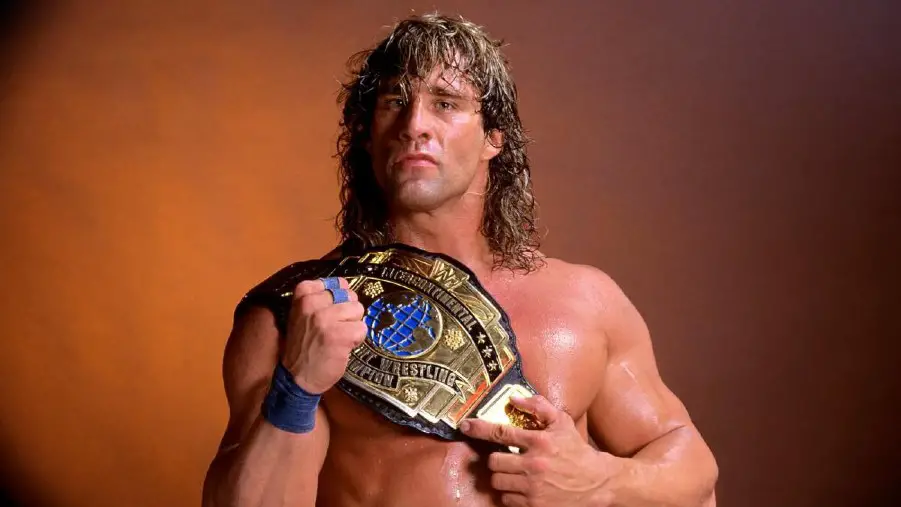
Largely a recluse since selling off his shares of World Class, Fritz had experienced the deaths of five of his six sons. Wife Doris divorced him months earlier, reportedly blaming him for the disintegration of the family.
In the summer of 1997, Fritz was hospitalised after a mild stroke. While there, doctors found that he had cancer that started in his lungs and had spread to his brain. Little more than six weeks later, in September of 1997, the patriarch of the Von Erich wrestling family died from the cancer, aged 68.
The Von Erich name would eventually be revived in professional wrestling. Kerry's daughter Lacey briefly wrestled for TNA Wrestling, while Kevin's sons Ross and Marshall have done well for themselves in Major League Wrestling and on the independents. On many occasions, Kevin has cornered for his sons, earning cheers for his occasional employment of the Iron Claw to neutralise any heels that dare interfere against his kids.
Of the wrestling Von Erichs, Kevin is the sole survivor from the first two generations. By the early nineties, Kevin started to distance himself from wrestling, and was all but retired before the end of 1995. In 2009, The Von Erich clan was inducted into WWE's Hall of Fame, with Kevin there to collect all the hardware on behalf of his fallen blood.
Among the many reflections Kevin has offered publicly in the intervening years, the most gut-wrenching was when he said, "I used to have five brothers - now I'm not even a brother."
Many a story of a once-hot entertainment empire has followed that familiar trend: unquestioning hysteria and mania during the dizzying good times, the gradual trickle of unpleasantries at or around the peak, followed by a swift fall from grace, and finally a sobering examination the entire life span, to try and pinpoint when, where and why the train started going off the tracks.
The post-mortem on the Von Erich wrestling phenomenon of the eighties has been plenty sobering. There are many contradictions to be found between the handcrafted mythos and the staggering reality. They were rebellious rock Gods that asked "How high?" when their father said jump. They were the faces of a timely moral crusade who discreetly indulged in vices. They were invincible heroes who dealt with unimaginable pain. And they were immortals, almost all of whom tragically died young.
The Von Erich book was largely a fairy tale, carefully assembled by an enterprising wrestling veteran who believed his kayfabe surname was to wrestling what Disney was to cartoons. Except Disney *drew* his biggest stars - Fritz's were his own flesh and blood.
And Fritz had great difficulty allowing his flesh and blood to remain human. Every aspect of his kids' professional lives had to be fantastical and larger-than-life, all the while he apparently cast his shadow over them in their personal lives.
As for when the ugly parts of his kids' humanity bled into public view, well, that's when Fritz pulled out the brush and started painting his own strokes. Fritz thought big and designed big when he set up the blueprints for the territory that his skillful offspring (and presumably *their* offspring) would rule for generations to come. Fritz envisioned a dynasty, while many of his boys didn't know if they had what it took to make those wild dreams a reality.
It's said that Fritz Von Erich would watch the monitor backstage at World Class tapings, and remark excitedly whenever his sons did anything slightly beyond rudimentary. If that's true, it would explain the dogged need to twist any narrative that might shade any of his sons as less than Godly. And it might explain how so many of his children's problems escalated with seemingly minimal intervention. Stories abound of one of the kids being arrested, and Fritz sweeping it under the rug, while giving the cops hell for daring to arrest one of his boys.
As Ric Flair later stated, "Fritz just wouldn't accept the reality of Kerry and his brothers' personal problems."
As the booker and world-builder, Fritz could spin tragedy and turmoil into story fodder at the drop of a hat. In contrast, by the time Kerry was coming undone in 1992, Fritz was calling WWE offices, pleading the company to help his vulnerable son with rehab. By that time, Fritz no longer had a wrestling empire to protect.
Today, the earlier generations of Von Erichs are viewed through two distinct lens: the kaleidoscope that allows for appreciation of the good things that a very unique family brought to a very unique world. And then, there's the lens of reality, forever trained upon the dinge behind that neatly constructed facade.
There will never be another wrestling family like the Von Erichs. Understanding the totality of their legacies on and off screen makes that a safe bet.
